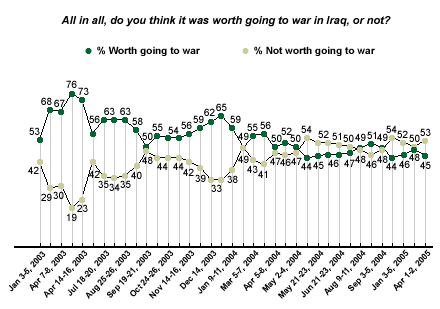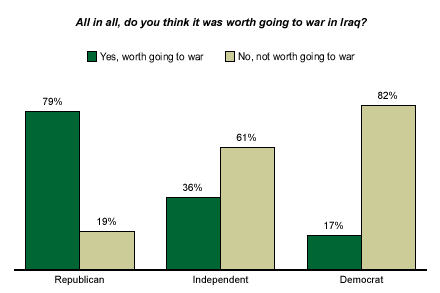Reminders that the war is far from over temper signs of progress in Iraq. A new Iraqi government is elected amid great fanfare, yet insurgents continue nearly daily attacks on civilians, police officers, and U.S. soldiers. Water and power are reportedly being restored in many areas; meanwhile militants kidnap an American contractor.
American opinion about Iraq is still mixed, but at this point it appears the negatives outweigh the positives. According to the most recent Gallup Poll* on the subject, fewer Americans say the situation in Iraq was worth going to war over than say that it was not.
Public Opinion Shift on Iraq
Shortly after the war began two years ago, most Americans thought the situation in Iraq was worth going to war over. In a March 24-25, 2003, poll, 68% said the war was worth it, and this sentiment climbed as high as 76% immediately following the fall of Baghdad. Support gradually declined over the summer and dropped to a low of 50% in September, after President Bush asked Congress for an additional $87 billion to fund the war, which he admitted was not going well in a nationally televised address. War support got a boost with the capture of Saddam Hussein in December 2003, but that proved to be short-lived.
By the end of January 2004, Gallup found for the first time less than a majority saying the war was worth it. Support rebounded somewhat in the spring, but tumbled again in May after news of U.S. soldiers abusing Iraqi prisoners made headlines. Since that time, support has been below the 50% mark with one exception (in late August 2004). The April 1-2 Gallup Poll shows 45% of Americans saying the war was worth it, while 53% say it was not.

Party Matters Most
While the public overall is fairly evenly split about the value of the war in Iraq, levels of support vary by political party, race, and age. Democrats are much less likely than Republicans to say it was worth going to war in Iraq. Nearly 8 in 10 Republicans (79%) say it was worth going to war, while just 19% say it was not worth it. Among Democrats, only 17% say it was worth it and 82% say it was not. The divide among political independents is not as wide: a third (36%) say it was worth going to war, while 61% say it was not.

Race and Age
The political split is related to the persistent racial divide in opinions of the war. White respondents are ambivalent -- 50% say the war was worth it and 48% say it was not. In contrast, 7 in 10 nonwhite respondents (72%) say the war was not worth it, compared with 26% who say it was.
The oldest and the youngest Americans are the least likely to think it was worth going to war in Iraq. A majority of 18- to 29-year-olds and a majority of Americans aged 65 and older think it was not worth going to war. Americans between the ages of 30 and 64 are more evenly split.
*These results are based on telephone interviews with a randomly selected national sample of 1,040 adults, aged 18 and older, conducted April 1-2, 2005. For results based on this sample, one can say with 95% confidence that the maximum error attributable to sampling and other random effects is ±3 percentage points. In addition to sampling error, question wording and practical difficulties in conducting surveys can introduce error or bias into the findings of public opinion polls.
